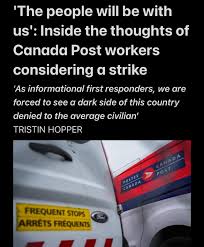Introduction
The negotiations between Canada Post and the Canadian Union of Postal Workers (CUPW) are a pivotal topic for many Canadians, especially in light of the essential role postal services play in everyday life. As discussions progress, they hold the potential to impact delivery times and postal rates significantly. This year has seen renewed focus and urgency as both parties work towards a resolution that satisfies the needs of the workers while ensuring efficient service for the public.
Current Status of Negotiations
As of October 2023, negotiations have seen occasional roadblocks, primarily concerning wage increases, job security, and working conditions. CUPW members have voiced their concerns about inflation and how it affects their livelihoods, prompting demands for substantial wage increases and improved benefits. Canada Post, on the other hand, emphasizes the need for sustainability and is looking for financial solutions that would allow them to maintain operational viability while addressing union demands.
Recent bargaining sessions have reportedly included discussions on introducing new job classifications and improving the workload management system for postal workers. Talks have also touched upon issues surrounding workplace safety and support, especially in light of increased demand during the pandemic.
Impact on Postal Services
The outcome of these negotiations will undoubtedly affect Canadian postal services, which have already been experiencing fluctuations due to external pressures. A strike or significant slowdown could lead to nationwide delays, emphasizing the importance of quick resolutions. Canada Post has implemented contingency plans in anticipation of possible disruptions, yet the effectiveness of these solutions remains to be seen.
Conclusion
As negotiations continue, both Canada Post and CUPW are under pressure to find common ground. The resolution of these negotiations is crucial for the postal industry, public services, and the economy at large. Stakeholders are keeping a close watch, as any extended period of disruption could have broader implications for inter-regional commerce and communication. Moving forward, it is hoped that both parties can reach a mutual agreement that prioritizes the welfare of postal workers while securing the reliable service that Canadians depend on.

